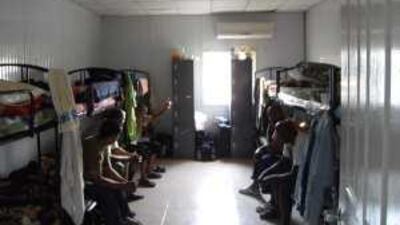ABU DHABI // Emirates Taxi is planning to hire up to 700 drivers from South Africa, just weeks after settling with 20 of their compatriots who returned home after finding the working conditions not to their liking. The last of the group left Abu Dhabi this month, many in debt and disappointed after failing to secure salaries and lifestyles that Emirates Taxi and its recruiter now agree were "unrealistic".
The men arrived in November and ended up living in a labour camp and paying Dh750 (US$200) for the privilege. In an e-mail last week, the South African ambassador, Abba Omar, said his embassy was not aware of the new call for drivers, but added that the previous incident was "resolved amicably". "We believe this was an unfortunate case which, in all likelihood, will not be repeated," he said. He did not expect the negative press in South Africa to harm bilateral relations.
"Part of the problem emanated with the agent who was involved in the recruitment," he said. Emirates Taxi and the Durban-based Emirates Recruitment Centre are trading blame over the case, which the Ministry of Labour is "treating very seriously", according to a statement. Marc Futter, who responded to a recruitment advertisement in a Durban newspaper last July, left a Dh7,600 per month job as a dispatch manager at a courier company but discovered upon arriving in Abu Dhabi that his earning potential as a driver was just a fraction of the 20,000 South African rand (Dh9,400) a month quoted to him by the recruiter, Hassina Ahmed.
"She assured me most of the drivers were living off tips and not touching their salaries," said Mr Futter, 36. "My plan was to stay for three years overseas for the first time in my life, and come back to study hotel management." He was among a dozen drivers who left after just two weeks. Another driver, who did not want to be named, said it was "impossible" to earn the salaries promised. "We thought we could make a living, but once we did the calculations, it was impossible," he said. "To make Dh300 a day, you must work maybe 18 hours."
Copies of one driver's pay slips showed that he worked back-to-back shifts multiple times in January, and made barely Dh200 a shift. A letter of demand from Emirates Taxi, dated July 4, 2009, stipulates a basic monthly salary of Dh850, plus commission, and that accommodation, food and medical benefits would be provided by the company. But upon arrival, the men claimed they were urged to sign a new contract with a basic salary of Dh300 a month. The National obtained copies of both contracts and a commission structure that apparently corroborated the South Africans' accounts.
Sayed Hakeem, the general manager for Emirates Taxi, denied the existence of a contract with basic pay of Dh300 per month. "It's all false information," he said. Mr Hakeem said the company's basic salary for drivers was Dh850 a month, plus commission and tips. "They'll end up taking at least Dh3,000 to Dh4,000 if they work hard," he said. Other taxi companies' basic salaries vary with the commission structure, from Dh850 to Dh1,200,
Mr Hakeem blamed the recruitment agent for misrepresenting the job conditions. "That South African agent gave the guys all kinds of false promises," he said. "We had nothing to do with it and we're trying to tell them that we need good drivers coming here, and the UAE will let the South Africans come and change their traffic licences." South African taxi drivers are in demand for their English skills.
In South Africa, Ms Ahmed said she only communicated to the men what she knew about the original offer, which included paid accommodation. "But just before issuing the visas to my passengers, they said it would be taken from their basic salary," she said. She conceded that she had never asked to see the promised accommodation while in Abu Dhabi to meet Emirates Taxi managers. "It was shocking," said Imran Conrad, from Cape Town. "On arrival to a place called Musaffah, three of the guys with us right at the gate demanded to be taken home. We realised we were in a labour camp, sharing a room with 11 other men."
Emirates Taxi said the company had terminated Ms Ahmed's contract. The recruitment of drivers is now being done by Fawzia Khan & Associates in Durban, which is offering candidates three-year contracts and commission-based potential earnings of as much as R10,000 a month. Ms Khan clarified that "the men are informed they're going to stay in what we call a hostel and what you refer to as a labour camp a general cost of about Dh750 a month".
Meanwhile, the repatriated drivers are demanding refunds of the Dh1,100 recruitment fee that they paid Ms Ahmed. The Ministry of Labour met the drivers three times since late January but did not refer the matter to the labour courts "to give the sponsor a grace period to find a proper solution". The ministry confirmed that the drivers cancelled their complaint on February 9, because they "reached an agreement with the sponsor and they decided to return to their home country, and the sponsor will cover their air ticket expenses".
The agreement was confidential, according to the drivers. Jameelah Daniels, a city councillor in Cape Town, advised job seekers to be wary. "It's outrageous because I just had a major fight to get these 20 people home," she said, alleging that the drivers' passports were confiscated. "Now there's 700 more. Who will fight the battle for them?" mkwong@thenational.ae

